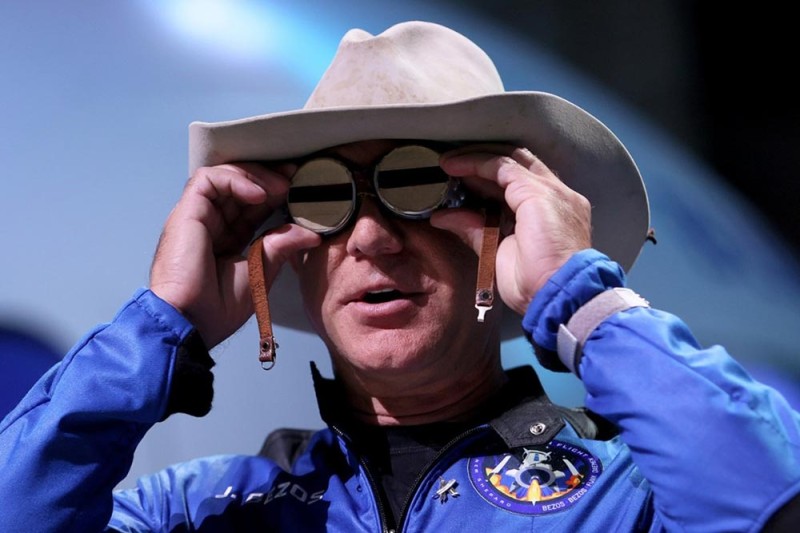
• 对Z世代而言,入门级岗位正悄然消失,找到不被人工智能取代的工作的关键,或许藏于太空之中。萨姆·奥尔特曼、埃隆·马斯克和杰夫·贝索斯等亿万富豪均乐观预测,大众太空旅行时代即将到来——未来十年内,大学毕业生或将奔赴火星。但并非所有人都认同这一观点;微软联合创始人比尔·盖茨(Bill Gates)就认为,资金更应该用来解决地球上的各种问题。
在这场人工智能革命中,年轻人成为受冲击最大的群体,而且这种趋势没有任何放缓的迹象。本月早些时候,斯坦福大学发布的一项研究显示,人工智能对美国入门级劳动者产生了“显著且不成比例的影响”,再次引发外界对下一代如何在劳动力市场站稳脚跟的担忧。
但对于那些担心未来就业形态的人来说,年轻职场人士或许需要放眼更广阔的天地,甚至将目光投向太空。因为那些颠覆传统职业的技术,同样可能加速太空旅游、行星殖民等全新产业的兴起。
这正是萨姆·奥尔特曼、埃隆·马斯克和杰夫·贝索斯等众多亿万富豪积极倡导并通过技术创新全力助推的未来愿景:未来最有保障、最赚钱的工作或许根本不在地球上。
萨姆·奥尔特曼:2035届毕业生将探索太阳系
萨姆·奥尔特曼因担任OpenAI(ChatGPT母公司)的首席执行官而广为人知,但他同样加入了看好太空生活的亿万富豪行列。他甚至表示,十年后的年轻人可能会放弃地球上的职业前景,转而投身更广阔的太阳系。
在今年8月接受视频记者克莱奥·阿布拉姆(Cleo Abram)采访时,萨姆·奥尔特曼表示:“到2035年,那时的大学毕业生——如果他们还会去上大学的话——很可能会登上飞船,执行探索太阳系的任务,从事一种全新的、激动人心的、高薪又超级有趣的工作。”
这些工作不仅将让阿尔法世代毕业生坐拥天价薪酬,他们还会“为你我感到惋惜,因为我们不得不做这些枯燥老旧的工作,而他们的一切都将更美好”。
尽管他的预测颇为大胆,但人工智能的快速发展正催生创新浪潮,并将助力解决包括太空生命维持在内的诸多社会难题。
埃隆·马斯克:人类最早或将在2028年登陆火星
作为特斯拉首席执行官也是全球首富,埃隆•马斯克堪称21世纪太空探索浪潮中最具影响力的推动者之一。毕竟,他是市值达4000亿美元的SpaceX的联合创始人兼首席执行官,而该公司正与美国国家航空航天局(NASA)携手推进太空探索。
尽管SpaceX屡遭挫折,但马斯克仍充满信心,预计无人火星火箭最早将于明年发射,而首次载人飞行则定在2028年。
早在2013年,马斯克就曾表示:“我希望死在火星上,但不是在着陆的那一刻。”
杰夫•贝索斯:太空业务将超越物流业务
杰夫•贝索斯当年在自家车库创立亚马逊时,只是怀揣着开办一家在线书店的构想。三十多年过去,他将其打造为一家市值逾2.4万亿美元的电商与数据服务帝国,其个人财富也累积至约2500亿美元。
但他预言,其太空技术公司蓝色起源(Blue Origin)终将创造更大财富。
他在去年年底《纽约时报》DealBook峰会上表示:“我认为这将成为我参与过的最伟大事业,但这需要一些时间。”
这位61岁的企业家至少确信,太空旅行将在其有生之年成为主流现实。蓝色起源的使命是打造“一个让数百万人能在太空生活和工作的未来,其根本目标是修复并守护地球”。
如今,蓝色起源最为人熟知的业务是太空旅游。今年早些时候,该公司的一枚火箭将贝索斯现任妻子劳伦·桑切斯(Lauren Sanchez)、歌手凯蒂·佩里(Katy Perry)和记者盖尔·金(Gayle King)送上了太空。
比尔•盖茨:我选择坚守地球
谈及太空旅行投资时,微软联合创始人比尔•盖茨持截然不同的看法。
他在2021年接受喜剧演员詹姆斯·柯登(James Corden)采访时表示:“太空?我们在地球上还有许多事情要做。”
盖茨在2023年接受英国广播公司(BBC)采访,当被问及是否值得花钱前往地球的邻居火星时,他表示不值得:“去火星实际上成本极其高昂。”
相反,他更愿意将资金投入到改善全球健康等慈善事业中。
他表示:“花一千美元就能买到麻疹疫苗,挽救一条生命。这足以让人回归现实,比去火星有意义。”(*)
译者:刘进龙
审校:汪皓
• 对Z世代而言,入门级岗位正悄然消失,找到不被人工智能取代的工作的关键,或许藏于太空之中。萨姆·奥尔特曼、埃隆·马斯克和杰夫·贝索斯等亿万富豪均乐观预测,大众太空旅行时代即将到来——未来十年内,大学毕业生或将奔赴火星。但并非所有人都认同这一观点;微软联合创始人比尔·盖茨(Bill Gates)就认为,资金更应该用来解决地球上的各种问题。
在这场人工智能革命中,年轻人成为受冲击最大的群体,而且这种趋势没有任何放缓的迹象。本月早些时候,斯坦福大学发布的一项研究显示,人工智能对美国入门级劳动者产生了“显著且不成比例的影响”,再次引发外界对下一代如何在劳动力市场站稳脚跟的担忧。
但对于那些担心未来就业形态的人来说,年轻职场人士或许需要放眼更广阔的天地,甚至将目光投向太空。因为那些颠覆传统职业的技术,同样可能加速太空旅游、行星殖民等全新产业的兴起。
这正是萨姆·奥尔特曼、埃隆·马斯克和杰夫·贝索斯等众多亿万富豪积极倡导并通过技术创新全力助推的未来愿景:未来最有保障、最赚钱的工作或许根本不在地球上。
萨姆·奥尔特曼:2035届毕业生将探索太阳系
萨姆·奥尔特曼因担任OpenAI(ChatGPT母公司)的首席执行官而广为人知,但他同样加入了看好太空生活的亿万富豪行列。他甚至表示,十年后的年轻人可能会放弃地球上的职业前景,转而投身更广阔的太阳系。
在今年8月接受视频记者克莱奥·阿布拉姆(Cleo Abram)采访时,萨姆·奥尔特曼表示:“到2035年,那时的大学毕业生——如果他们还会去上大学的话——很可能会登上飞船,执行探索太阳系的任务,从事一种全新的、激动人心的、高薪又超级有趣的工作。”
这些工作不仅将让阿尔法世代毕业生坐拥天价薪酬,他们还会“为你我感到惋惜,因为我们不得不做这些枯燥老旧的工作,而他们的一切都将更美好”。
尽管他的预测颇为大胆,但人工智能的快速发展正催生创新浪潮,并将助力解决包括太空生命维持在内的诸多社会难题。
埃隆·马斯克:人类最早或将在2028年登陆火星
作为特斯拉首席执行官也是全球首富,埃隆•马斯克堪称21世纪太空探索浪潮中最具影响力的推动者之一。毕竟,他是市值达4000亿美元的SpaceX的联合创始人兼首席执行官,而该公司正与美国国家航空航天局(NASA)携手推进太空探索。
尽管SpaceX屡遭挫折,但马斯克仍充满信心,预计无人火星火箭最早将于明年发射,而首次载人飞行则定在2028年。
早在2013年,马斯克就曾表示:“我希望死在火星上,但不是在着陆的那一刻。”
杰夫•贝索斯:太空业务将超越物流业务
杰夫•贝索斯当年在自家车库创立亚马逊时,只是怀揣着开办一家在线书店的构想。三十多年过去,他将其打造为一家市值逾2.4万亿美元的电商与数据服务帝国,其个人财富也累积至约2500亿美元。
但他预言,其太空技术公司蓝色起源(Blue Origin)终将创造更大财富。
他在去年年底《纽约时报》DealBook峰会上表示:“我认为这将成为我参与过的最伟大事业,但这需要一些时间。”
这位61岁的企业家至少确信,太空旅行将在其有生之年成为主流现实。蓝色起源的使命是打造“一个让数百万人能在太空生活和工作的未来,其根本目标是修复并守护地球”。
如今,蓝色起源最为人熟知的业务是太空旅游。今年早些时候,该公司的一枚火箭将贝索斯现任妻子劳伦·桑切斯(Lauren Sanchez)、歌手凯蒂·佩里(Katy Perry)和记者盖尔·金(Gayle King)送上了太空。
比尔•盖茨:我选择坚守地球
谈及太空旅行投资时,微软联合创始人比尔•盖茨持截然不同的看法。
他在2021年接受喜剧演员詹姆斯·柯登(James Corden)采访时表示:“太空?我们在地球上还有许多事情要做。”
盖茨在2023年接受英国广播公司(BBC)采访,当被问及是否值得花钱前往地球的邻居火星时,他表示不值得:“去火星实际上成本极其高昂。”
相反,他更愿意将资金投入到改善全球健康等慈善事业中。
他表示:“花一千美元就能买到麻疹疫苗,挽救一条生命。这足以让人回归现实,比去火星有意义。”(*)
译者:刘进龙
审校:汪皓
• As entry-level jobs disappear into thin air for Gen Z, the secret to finding an AI-proof job may lie in space. Billionaires Sam Altman, Elon Musk, and Jeff Bezos are all bullish that mainstream space travel is on its way—and college graduates could be headed to Mars within the next decade. But not everyone agrees; Microsoft cofounder Bill Gates says money is better spent solving the myriad of problems on Earth.
Young people are getting the short end of the stick when it comes to the AI revolution—and there’s no sign of it slowing. A Stanford University study released earlier this month found AI is having a “significant and disproportionate impact” on entry-level workers in the U.S., raising fresh concerns about how the next generation will find its footing in the labor market.
But for those worried about what the future of work will look like, young professionals may need to look bigger—and even toward the sky. That’s because the same technology that may be disrupting traditional jobs could accelerate entirely new industries from space tourism to planet colonization.
It’s a future that many billionaires, including Sam Altman, Elon Musk, and Jeff Bezos are not just embracing but also enabling through their innovation: The most secure—and lucrative—jobs of tomorrow may not be on Earth at all.
Sam Altman: The class of 2035 will be exploring the solar system
Sam Altman is known for being CEO of OpenAI (the company behind ChatGPT), but he’s also joining the growing list of billionaires who are bullish about life in space. In fact, he said he believes young people a decade from now may be leaving behind career prospects on Earth in favor of the broader solar system.
“In 2035, that graduating college student, if they still go to college at all, could very well be leaving on a mission to explore the solar system on a spaceship in some completely new, exciting, super well-paid, super interesting job,” Altman said to video journalist Cleo Abram in August.
These jobs will not only enable Gen Alpha graduates to reel in sky-high salaries, but they’ll also be “feeling so bad for you and I that we had to do this really boring, old work and everything is just better.”
And while his predictions are bold, AI’s rapid development is multiplying innovation and will help solve some of society’s biggest problems, including, he implies, how to sustain life in space.
Elon Musk: Humans on Mars as soon as 2028
Elon Musk, Tesla CEO and the richest man on the planet, has single-handedly been one of most influential leaders in pushing for 21st century space. After all, he’s the cofounder and CEO of $400 billion SpaceX, which has worked hand-in-hand with NASA to advance space exploration.
SpaceX has its fair share of setbacks, including just this week when a Mars test rocket was delayed. However, Musk is hopeful unmanned Mars rockets will commence as soon as next year, with the first crewed-flight in 2028.
“I’d like to die on Mars, just not on impact,” Musk said in 2013.
Jeff Bezos: Space will be bigger than packages
Jeff Bezos started Amazon in his garage as an idea for an online bookstore. Over three decades, he built it into an over $2.4 trillion ecommerce and data service empire—and it helped lead his net worth to about $250 billion.
However, he expects his space technology company, Blue Origin, to eventually make him even more.
“I think it’s going to be the best business that I’ve ever been involved in, but it’s going to take a while,” he said at The New York Times’ DealBook Summit late last year.
As a 61-year-old, that at least indicates space travel will be a mainstream reality in his lifetime. The company’s mission is focused on “a future where millions of people will live and work in space with a single-minded purpose: to restore and sustain Earth.”
The company is most known today for space tourism. Earlier this year, a Blue Origin rocket sent Bezos’s now-wife, Lauren Sanchez, as well as singer Katy Perry and journalist Gayle King to the edge of Earth’s atmosphere.
Bill Gates: I’m sticking to planet Earth
Microsoft cofounder Bill Gates has a starkly different view when it comes to investing in traveling to other planets.
“Space? We have a lot to do here on Earth,” he said in an interview with comedian James Corden in 2021.
When he was specifically asked about traveling to Earth’s neighbor, he said it might not be worth the money: “It’s actually quite expensive to go to Mars,” Gates told BBC in 2023.
Instead, he’d much rather spend his money on his philanthropic causes like improving global health.
“You can buy measles vaccines and save lives for a thousand dollars per life saved,” he said. “It just kind of grounds you. Don’t go to Mars.”

